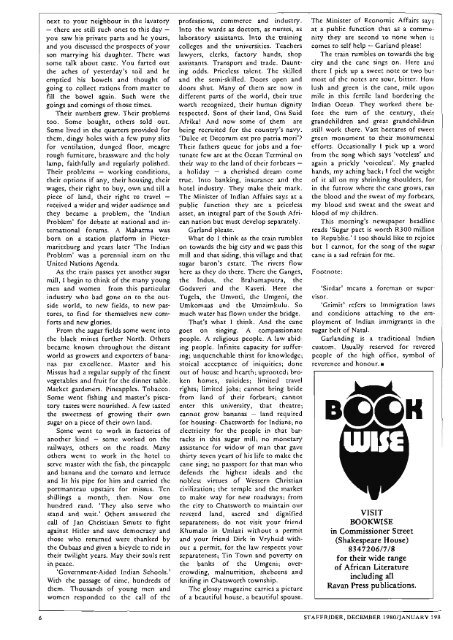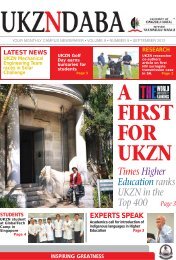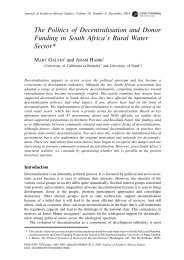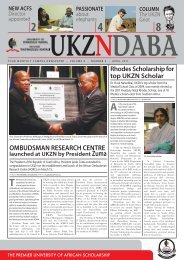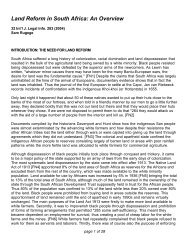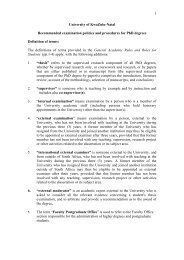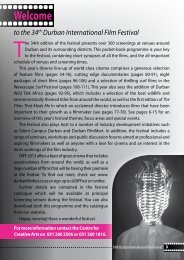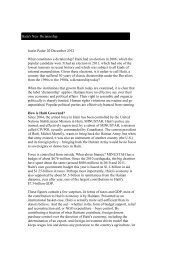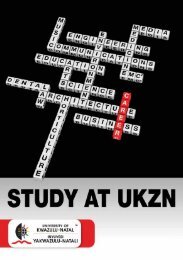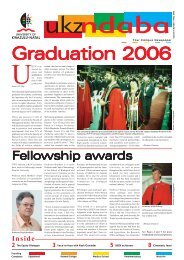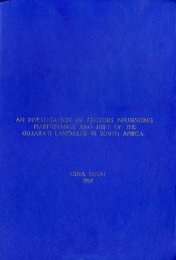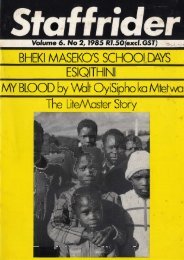Staffrider Vol.3 No.4 Dec-Jan 1980 - DISA
Staffrider Vol.3 No.4 Dec-Jan 1980 - DISA
Staffrider Vol.3 No.4 Dec-Jan 1980 - DISA
Create successful ePaper yourself
Turn your PDF publications into a flip-book with our unique Google optimized e-Paper software.
next to your neighbour in the lavatory— there are still such ones to this day —you saw his private parts and he yours,and you discussed the prospects of yourson marrying his daughter. There wassome talk about caste. You farted outthe aches of yesterday's toil and heemptied his bowels and thought ofgoing to collect rations from master tofill the bowel again. Such were thegoings and comings of those times.Their numbers grew. Their problemstoo. Some bought, others sold out.Some lived in the quarters provided forthem, dingy holes with a few puny slitsfor ventilation, dunged floor, meagrerough furniture, brassware and the holylamp, faithfully and regularly polished.Their problems — working conditions,their options if any, their housing, theirwages, their right to buy, own and till apiece of land, their right to travel —received a wider and wider audience andthey became a problem, the 'IndianProblem' for debate at national and internationalforums. A Mahatma wasborn on a station platform in Pietermaritzburgand years later 'The IndianProblem' was a perennial item on theUnited Nations Agenda.As the train passes yet another sugarmill, I begin to think of the many youngmen and women from this particularindustry who had gone on to the outsideworld, to new fields, to new pastures,to find for themselves new comfortsand new glories.From the sugar fields some went intothe black mines further North. Othersbecame known throughout the distantworld as growers and exporters of bananaspar excellence. Master and hisMissus had a regular supply of the finestvegetables and fruit for the dinner table.Market gardeners. Pineapples. Tobacco.Some went fishing and master's piscatorytastes were nourished. A few tastedthe sweetness of growing their ownsugar on a piece of their own land.Some went to work in factories ofanother kind — some worked on therailways, others on the roads. Manyothers went to work in the hotel toserve master with the fish, the pineappleand banana and the tomato and lettuceand lit his pipe for him and carried theportmanteau upstairs for missus. Tenshillings a month, then. Now onehundred rand. 'They also serve whostand and wait.' Others answered thecall of <strong>Jan</strong> Christiaan Smuts to fightagainst Hitler and save democracy andthose who returned were thanked bythe Oubaas and given a bicycle to ride intheir twilight years. May their souls restin peace.'Government-Aided Indian Schools.'With the passage of time, hundreds ofthem. Thousands of young men andwomen responded to the call of theprofessions, commerce and industry.Into the wards as doctors, as nurses, aslaboratory assistants. Into the trainingcolleges and the universities. Teacherslawyers, clerks, factory hands, shopassistants. Transport and trade. Dauntingodds. Priceless talent. The skilledand the semi-skilled. Doors open anddoors shut. Many of them are now indifferent parts of the world, their trueworth recognized, their human dignityrespected. Sons of their land, Ons SuidAfrika! And now some of them arebeing recruited for the country's navy.'Duke et <strong>Dec</strong>orum est pro patria mori'?Their fathers queue for jobs and a fortunatefew are at the Ocean Terminal ontheir way to the land of their forbears —a holiday — a cherished dream cometrue. Into banking, insurance and thehotel industry. They make their mark.The Minister of Indian Affairs says at apublic function they are a pricelessasset, an integral part of the South Africannation but must develop separately.Garland please.What do I think as the train rumbleson towards the big city and we pass thismill and that siding, this village and thatsugar baron's estate. The rivers flowhere as they do there. There the Ganges,the Indus, the Brahamaputra, theGodaveri and the Kaveri. Here theTugela, the Umvoti, the Umgeni, theUmkomaas and the Umzimkulu. Somuch water has flown under the bridge.That's what I think. And the canegoes on singing. A compassionatepeople. A religious people. A law abidingpeople. Infinite capacity for suffering;unquenchable thirst for knowledge;stoical acceptance of iniquities; doneout of house and hearth; uprooted; brokenhomes, suicides; limited travelrights; limited jobs; cannot bring bridefrom land of their forbears; cannotenter this university, that theatre;cannot grow bananas — land requiredfor housing: Chatsworth for Indians; noelectricity for the people in that barracksin this sugar mill; no monetaryassistance for widow of man that gavethirty seven years of his life to make thecane sing; no passport for that man whodefends the highest ideals and thenoblest virtues of Western Christiancivilization; the temple and the marketto make way for new roadways; fromthe city to Chatsworth to maintain ourrevered land, sacred and dignifiedseparateness; do not visit your friendKhumalo in Umlazi without a permitand your friend Dirk in Vryheid withouta permit, for the law respects yourseparateness; Tin Town and poverty onthe banks of the Umgeni; overcrowding,malnutrition, shebeens andknifing in Chatsworth township.The glossy magazine carries a pictureof a beautiful house, a beautiful spouse.The Minister of Economic Affairs saysat a public function that as a communitythey are second to none when itcomes to self help — Garland please!The train rumbles on towards the bigcity and the cane sings on. Here andthere I pick up a sweet note or two butmost of the notes are sour, bitter. Howlush and green is the cane, mile uponmile in this fertile land bordering theIndian Ocean. They worked there beforethe turn of the century, theirgrandchildren and great grandchildrenstill work there. Vast hectares of sweetgreen monument to their monumentalefforts. Occasionally I pick up a wordfrom the song which says 'voteless' andagain a prickly 'voiceless'. My gnarledhands, my aching back; I feel the weightof it all on my shrinking shoulders, forin the furrow where the cane grows, ranthe blood and the sweat of my forbears,my blood and sweat and the sweat andblood of my children.This morning's newspaper headlinereads 'Sugar pact is worth R300 millionto Republic' I too should like to rejoicebut I cannot, for the song of the sugarcane is a sad refrain for me.Footnote:'Sirdar' means a foreman or supervisor.'Grimit' refers to Immigration lawsand conditions attaching to the employmentof Indian immigrants in thesugar belt of Natal.Garlanding is a traditional Indiancustom. Usually reserved for reveredpeople of the high office, symbol ofreverence and honour. •BCSftKVISITBOOKWISEin Commissioner Street(Shakespeare House)8347206/7/8for their wide rangeof African Literatureincluding allRavan Press publications.6 STAFFRIDER, DECEMBER <strong>1980</strong>/JANUARY 198


